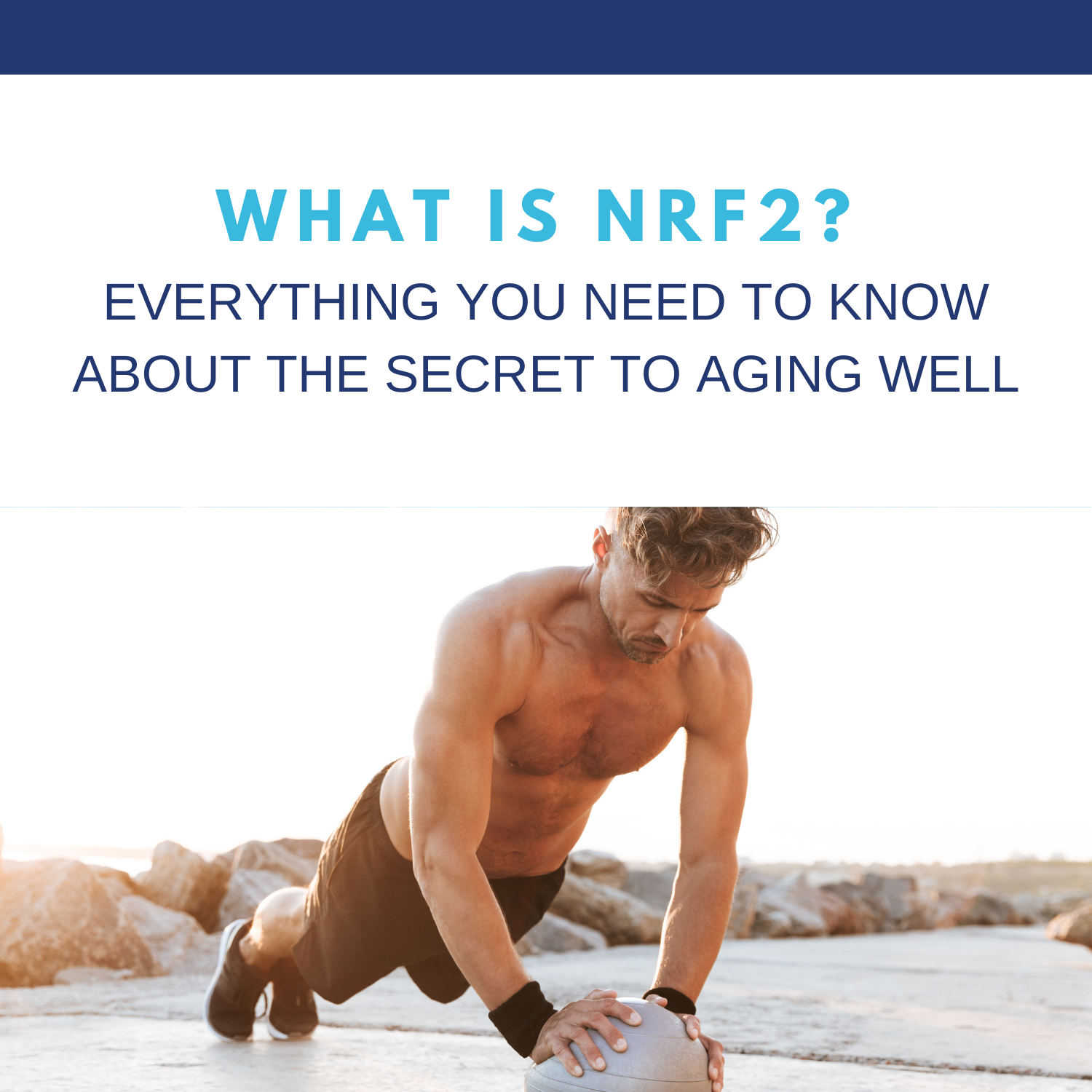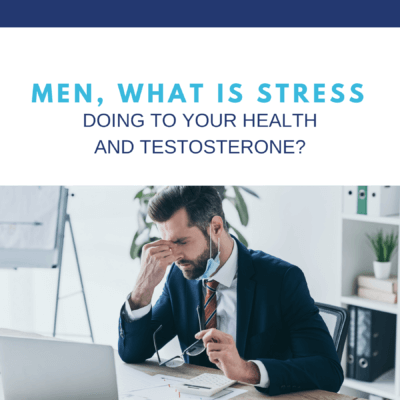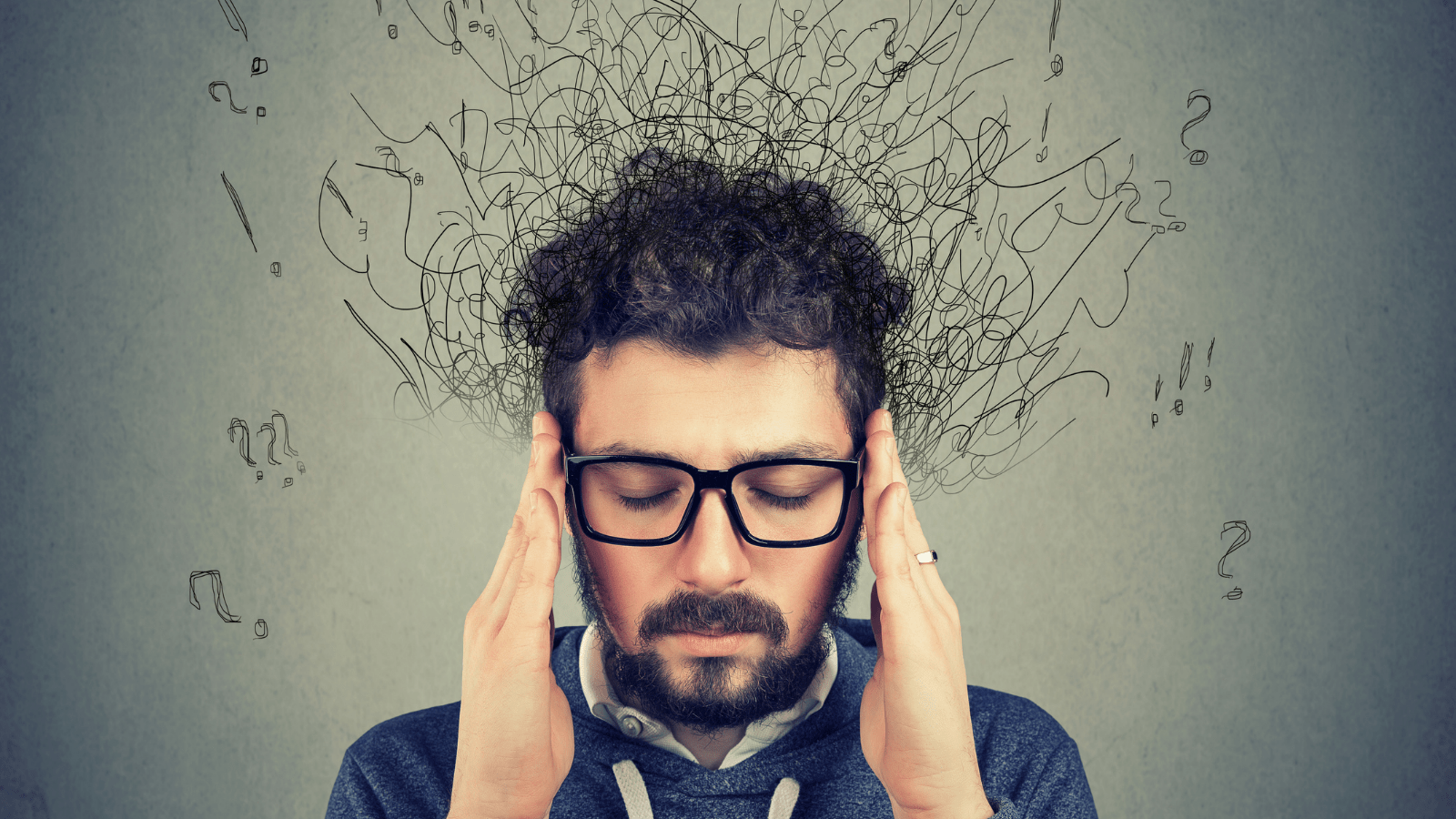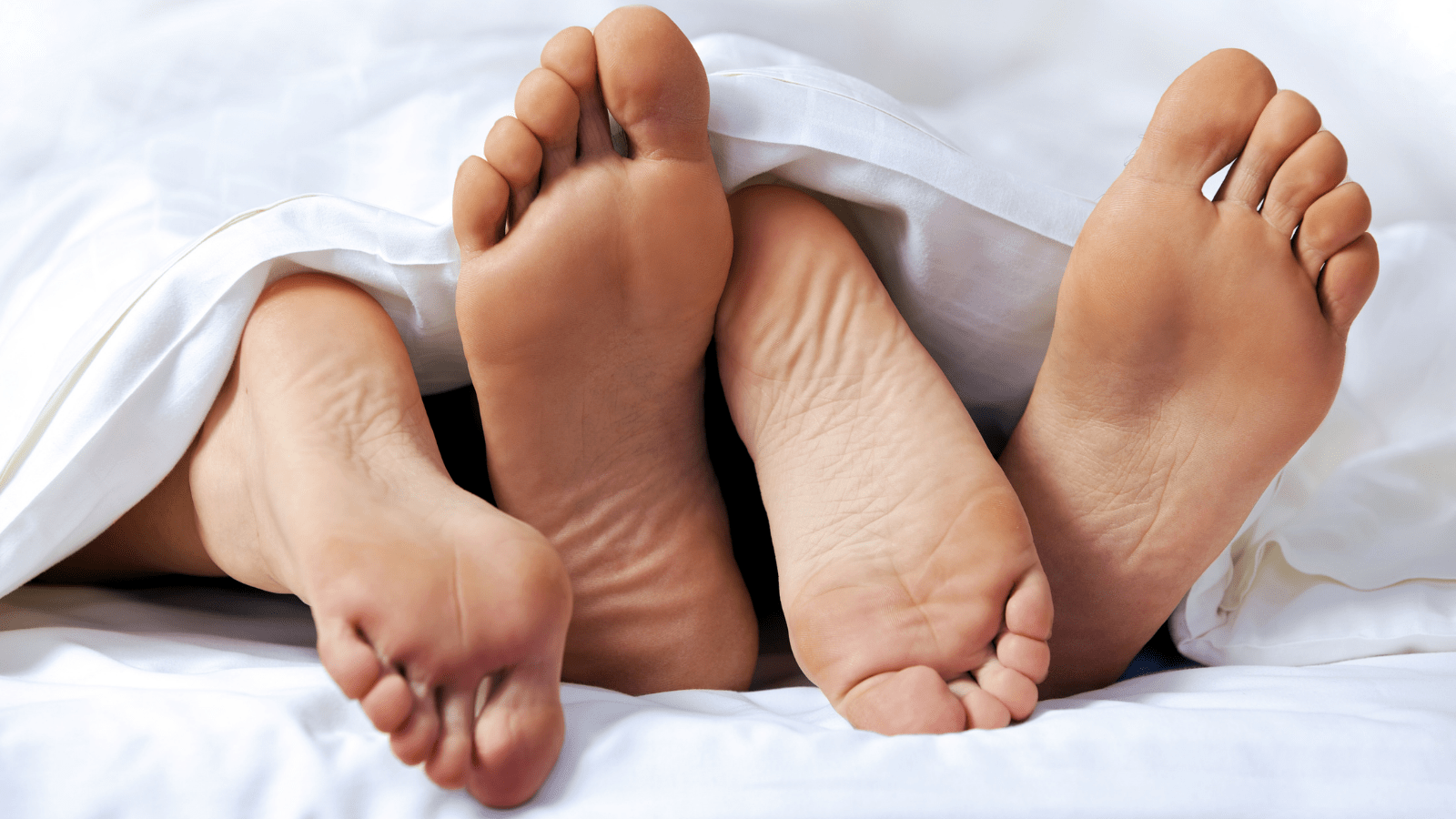Feel like you’re just not operating at the level you used to?
People tell us that that happens with age—that our bodies start to break down.
But the most recent science is actually calling into question the inevitability of the symptoms of aging. New research in microbiology, chemistry, and genomics is showing us that those uncomfortable symptoms of aging might not be locked in.
This is where “biohacking” comes from: it’s the idea that you can give your body exactly what it needs to properly repair and rejuvenate itself. The result? Optimized health and performance.
Nrf2 is one of the most exciting discoveries in this area and holds some real promise as an anti-aging agent and as a support for your long-term health. In this article, I’ll explain what it is, what it does, and why it matters for your aging.
What is Nrf2?
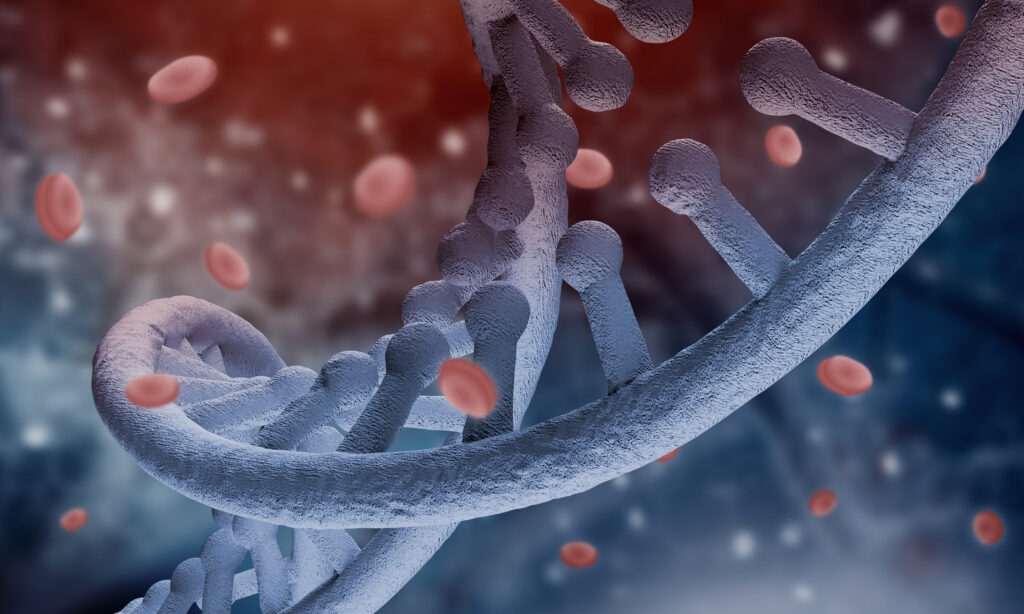
Nrf2, short for “nuclear factor erythroid 2-related factor 2”, is a protein that is found in your cells. It is a type of protein called a “transcription factor”, which means that it is involved in gene expression—activating and deactivating parts of a genetic sequence.
Which genes does Nrf2 affect? It regulates the expression of antioxidant proteins and enzymes, increasing their production to help your body fight off molecules that attack your cells.
Nrf2 has been found to be an important part of your body’s system of regulating metabolism, inflammation, and immune responses.
What’s special about Nrf2?

Nrf2 is a big deal because it could be the key to aging gracefully and healthily.
When you’re young, your body is good at balancing all the needs of your body at the cellular level. But as you age, these important chemical signallers decline. You begin to produce less of the substances that you need to properly regulate your body.
That means that there are fewer of the peptides, proteins, hormones, and enzymes that help your body repair and rejuvenate. Things start to break down.
The result is that your body gets slower at repairing itself. That’s why you feel tired more often, your body takes longer to recover from exercise, and your skin begins to see signs of aging. You might also notice issues with your sleep or even erectile dysfunction.
Oxidative stress contributes to symptoms of aging
At the cellular level, what’s happening is that free radicals are constantly bombarding your cells. The damage caused by these attacks causes your cells to go into a state called oxidative stress, and stop functioning properly.
When you’re young, your body can easily fight free radicals back. But as you get older, your body can’t do this as effectively. That’s when symptoms of aging start getting worse.
Antioxidants fight free radicals and reduce oxidative stress
You’ve probably heard of the health benefits of antioxidants. Some foods are high in antioxidants and that’s why health professionals sometimes encourage you to include them in your diet.
Antioxidants help neutralize free radicals and minimize the damage that they cause. That helps reduce the symptoms of aging.
But antioxidants aren’t very efficient. One antioxidant molecule neutralizes only one free radical. With more and more free radicals, we need more and more antioxidants. At some point, the antioxidants can’t keep up.
What does Nrf2 do?
Nrf2 provides a powerful solution to overcome free radicals. It’s known as the “master regulator” of our body’s antioxidant response.
When Nrf2 is activated, it enters the nucleus and turns on several hundred genes, known collectively as “survival genes.” This, in turn, initiates the production of several of your body’s own powerful enzymes that fight free radicals. These enzymes include catalase, glutathione, and superoxide dismutase (SOD).
These enzymes are much more effective than antioxidants at getting rid of free radicals—they can neutralize over 1 million free radicals a second. What that means is that your body can clean itself out quickly and fewer of your cells get into a state of oxidative stress.
Ultimately, that means you feel fewer symptoms of aging: better energy, better sleep, and even a better sex life.
How do I get Nrf2?

Great, Nrf2 can support my health. How do I get it?
You actually don’t need to get Nrf2—it’s already right there in your cells. It comes pre-installed.
The problem is that it’s not activated. It’s a bit like an engine: it just sits in your cells not doing anything until it’s turned on. That’s what Nrf2 activation therapies do: they get into your cells to turn on Nrf2 so that it can enter the nucleus and work its magic.
Some foods have been shown to activate Nrf2 and the Nrf2 pathway. These have been supported by studies in nutrigenomics—the study of how food influences gene expression and cellular function.
Some Nrf2-activating foods include:
Dark chocolate
Legumes, like lentils, beans, and peas
Vegetables, especially dark leafy greens like spinach and cruciferous vegetables like broccoli, cauliflower, and bok choy
Spices, especially ginger, turmeric, cinnamon, cloves, and yellow mustard
Herbs, like oregano
Red wine
Tea, especially green and white teas
What about Nrf2 supplements? Do they work?
In addition to activating Nrf2 through the diet, there are now supplements that activate Nrf2 and significantly reduce oxidative stress.
These have been extremely well-researched by the scientific community and some of the supplements have very strong evidence supporting their use.
Protandim®, for example, is a supplement designed to activate Nrf2. There have been numerous studies that demonstrate that it improves your body’s antioxidant response capacity. Peer-reviewed, human clinical studies show that it reduces cellular stress in humans by an average of 40 percent in 30 days. Research even suggests that it could be effective in preventing age-related diseases like:
Various types of cancer, like skin and colon cancers
The takeaway for your health: Nrf2 activators could help you feel younger. A men’s health secret.

We often think that there isn’t much we can do about the declines in our bodies that come with age. But science is showing us that that’s not necessarily the case.
There actually may be ways that we can give our body what it needs to better regulate, repair, and rejuvenate itself.
Nrf2 appears to be one of those ways. Activating the Nrf2 pathway could be a relatively simple—but powerful—way to help you feel younger again.
It might be as easy as making good diet choices or taking a supplement.
Schedule a consultation to learn how to personalized health advice so you can live your life to the fullest.
Ready to take the next steps?
Download the Blueprint
Schedule a Call
**************************
 In Male 2.0™, Dr. Tracy Gapin has turned everything we once thought we knew about men’s health and performance upside down. The old model of how to be “a man” is broken. A man who works himself to death. Unfortunately, a man who tries to NOT get sick but isn’t really healthy either. And a man who takes a pill for every ill but is never really cured. That was Male 1.0. Now, imagine being THE MAN ─ owning your performance in the bedroom, the weight room, and the boardroom. Living a fully optimized life. Becoming limitless. This is Male 2.0!
In Male 2.0™, Dr. Tracy Gapin has turned everything we once thought we knew about men’s health and performance upside down. The old model of how to be “a man” is broken. A man who works himself to death. Unfortunately, a man who tries to NOT get sick but isn’t really healthy either. And a man who takes a pill for every ill but is never really cured. That was Male 1.0. Now, imagine being THE MAN ─ owning your performance in the bedroom, the weight room, and the boardroom. Living a fully optimized life. Becoming limitless. This is Male 2.0!
Tracy Gapin, MD, FACS is a board-certified Urologist, world renowned Men’s Health & Performance Expert, Author, and Professional Speaker. Using state-of-the-art biometric monitoring, nutrition and lifestyle intervention, Dr. Gapin coaches Fortune 500 executives and evolutionary leaders of business, sports medicine, and high performance. He specializes in cutting-edge precision medicine with an emphasis on epigenetics, providing men with a personalized path to optimizing health & performance. www.GapinInstitute.com
Want more tips to optimize your health? Listen to the latest podcasts. Click HERE
References
Houghton, C. A., Fassett, R. G., & Coombes, J. S. (2016). Sulforaphane and other nutrigenomic Nrf2 activators: can the clinician’s expectation be matched by the reality?. Oxidative Medicine and Cellular Longevity, 2016. https://doi.org/10.1155/2016/7857186
Hybertson, B. M., Gao, B., Bose, S. K., & McCord, J. M. (2011). Oxidative stress in health and disease: the therapeutic potential of Nrf2 activation. Molecular Aspects of Medicine, 32(4-6), 234-246.
Lim, J. L., der Pol, V., Susanne, M. A., Baron, W., McCord, J. M., De Vries, H. E., & Van Horssen, J. (2016). Protandim protects oligodendrocytes against an oxidative insult. Antioxidants, 5(3), 30. https://doi.org/10.3390/antiox5030030

